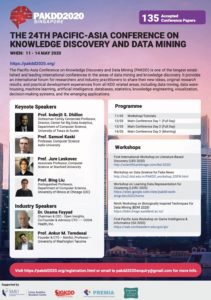The 24th Pacific-Asia Conference on Knowledge Discovery & Data Mining
12 May, 2020 08:00 am (IST)Today I will be delivering an invited talk at PAKDD2020 – The 24th Pacific-Asia Conference on Knowledge Discovery and Data Mining. The original plan was for me to be in Singapore to deliver this talk. Unfortunately, travel is out of the question these days. But the conference decided a month ago to hold the 24th version of this conference on-line rather than postpone or cancel.
Despite the move of the venue from Singapore to Cyberspace, the relevance, content, and level of interest have not changed. The conference flyer is available here. The program is accessible on this link.
My Invited Talk
I will deliver an Industry Talk today at 10 AM Tuesday, May 12, 2020. My message is about reminding the audience that there is a wide gap between Artificial Intelligence #AI as a field and the reality of pragmatic consideration for what is needed to make AI Work in reality. I will share lessons learned from the “front lines” of making AI actually work in the enterprise. A key notion that is missed by most is the strong dependence of working AI on Data.

A Brief History of AI: Preparing for the 3rd AI Winter
In order to learn from the past, I will share my personal “Brief History of AI” – this history came out of many requests I received from the executive teams or boards of Fortune1000 companies asking me to explain: What is AI and how is it relevant to our company?” – The history sets the context to explain what works and what does not, and why we went through two AI Winters before. Both winters were an outcome of hype and setting the wrong expectations. We seem to be doing the same one-third time with unreasonable expectations, fears and hopes attached to what AI can really do. Hence my prediction that “Winter is Coming” again and we discuss how to prepare for it by realizing what works.
No Data no AI
One emerging theme is that the only parts of AI that successfully survived the last two winters are parts of Machine Learning (#ML). I believe the same will happen again with the oncoming 3rd AI winter. But to have working ML, you need to have Data that is usable and managed as an asset. We will talk about what is needed to achieve that.
5 Lessons for Pragmatic AI in the Enterprise
I will share 5 lessons on making AI work in pragmatic and enterprise settings. These lessons come out of my experience across three decades of making AI and ML work in many applied settings. They also serve as set advice on how to approach AI projects. As a result of the #COVID19 pandemic, we have experienced a total acceleration of digital transformation across all sectors: government, education, business, commerce, and even meetings like this one. As humanity rushes to alternatives that avoid human contact, the age of digital channels has become mainstream. Yet most Digital Transformations forget that with loss of direct interactions between humans results in losing insight into what is working and what is not working as we deliver services and products via the new digital channels. Making digitization intelligent and sustainable requires insights and understanding that can only come from capturing and managing the torrent of Data that digital channels produce. This is often forgotten in typical Digital Transformations and Data becomes an after-thought. Whence no insights, understanding, and working AI will be possible.
Data needs Data Science
Since the use of Data requires Analysts, Data Scientists, Data Engineers, Machine Learning practitioners, and many related analytics skills, I conclude my talk with a quick review of our global Initiative on Analytics and Data Science Standards (IADSS.org) where we have been engaging in creating the standards of what is expected in terms of skills and knowledge that analytical professionals must possess to be qualified for these roles. Our initiative targets not just understanding the body of knowledge underlying the related roles, but also the standards that skills must meet, and eventually how to assess this knowledge. The first part of the work on IADSS will be published in the next issue of the Harvard Data Science Review publication.


.svg)
.svg)